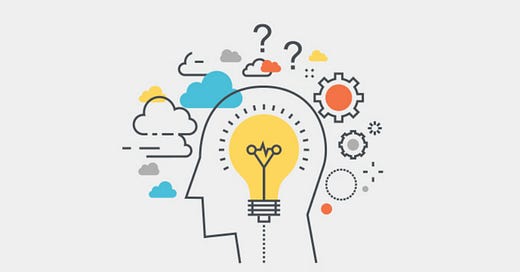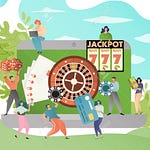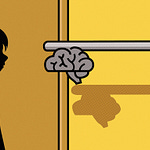At one point in my life, I thought that in Pizza Hut’s “Makin’ it great” ad campaign, they were actually saying “Brickin’ a brick.”
I mean I was a toddler, but still. Brickin’ a brick. I believed this for years, even when I was old enough to logically understand “brickin’ a brick” doesn’t make any fucking sense.
I always thought it would be funny if a big company ran a huge ad campaign with a slogan that was totally meaningless just to see how it would perform. That’s what I’d do if I were in charge. “McDonald’s: Ready for the lightning?” Then we’d spend millions of dollars on it, maybe changing the classic ‘M’ logo to add in lightning bolts, and then I’d get fired.
It didn’t matter that I believed Pizza Hut’s slogan was “Brickin’ a brick.” I got by. Even if I believed it today, it probably wouldn’t change much for me. It’s okay to have beliefs that are wrong. Most thoughts—and even actions—don’t matter.
The majority of what you think you know is probably wrong, and most of what’s right doesn’t mean shit anyway. Sometimes, though, you come across an idea that’s truly impactful to your life. It might still be wrong, but at least it’s useful for you, which is better than being wrong and useless I suppose.
I think the value of knowledge probably grows exponentially such that most of it is basically worthless but a small percentage is overwhelmingly valuable. This has been my experience, anyway, as a few basic ideas capable of shifting my worldview have been more valuable than everything else I know combined, so I’ve tried to prioritize finding this rare knowledge that actually makes a difference, blocking out almost everything in search of the truly scarce stuff.
With that said, I thought it might be cool to talk about the most impactful ideas that have changed my life thus far. The main criteria I used for selecting these is that each idea is something with which I at some point either disagreed or didn’t even really comprehend. It’s really important to get adequate sleep, but everyone knows that. These are all ideas that at some point I didn’t grasp, but ones that made profound impacts to my life once I did.
The Big Concepts
Convexity
Errors, randomness, and “the unexpected” should help you, not harm you.
If you’ve read my articles for more than 10 minutes, you probably know I’ve learned so much from Nassim Nicholas Taleb. From black swans to antifragility to being a giant dick to anyone who disagrees with you on Twitter, I’d say I owe more of my success to Taleb than anyone else I’ve read, even if he’s a total dick on Twitter.
The main idea that’s changed my worldview is convexity, and specifically the concept of acquiring more benefits than harm from chaotic events. Whereas most people focus on improving prediction accuracy—and sometimes in areas in which that’s nearly impossible—few properly focus on the payoffs, which are more easily controllable and offer a larger usable edge in terms of competition.
I applied this to DFS by focusing on ownership and lineup composition instead of projection accuracy. That is, maybe this player or team that everyone thinks will do well actually will, but maybe they won’t, and if they don’t, how can I benefit to the greatest degree?
One way to apply convexity to your life is to mimic evolution:
Don’t suppress chaos.
Natural selection is what Taleb would term “antifragile”—the opposite of fragile—because not only is it not harmed by chaos, it benefits from it. A species can change for the better fairly quickly in evolutionary terms from a single random genetic mutation.
Even natural disasters are positives for most species as a whole, assuming they’re not entirely killed off, because they end up coming back stronger and more prepared than before. Humans, too, are hopefully more prepared for the next pandemic; COVID has been devastatingly brutal, but “good” and “bad” are designations that often change based on your time horizon. What’s bad in a static environment can often be one of the most beneficial things when viewed long-term.
“Failure saves lives. In the airline industry, every time a plane crashes the probability of the next crash is lowered by that. So these people died, but we have effectively improved the safety of the system, and nothing failed in vain.”
By embracing chaos in all aspects of life, you’re set up for more sustainable long-term success. That’s one reason I tweeted this:
Confusing volatility with risk is why employees - smooth income, no variation - think they're safe when it's really the riskiest position (and lowest EV) of allNot all jobs are the same and every person is different; there’s no one-size-fits-all plan for everyone. In fact, most people are probably best off in the employee role.
Generally speaking, though, one of the biggest misconceptions about being a salaried employee is that it’s safer than something like an independent contractor. Being a contractor isn’t always a great solution—it’s not feasible in some areas and takes a long time to build a customer base—but who do you think is more susceptible to a sharp change in income: someone making $70,000 a year from one employer or someone earning the same amount from eight clients in two different niches? The latter is more volatile, but the former is riskier.
Evolution embraces chaos, and in exchange eventually delivers the best results. Without that volatility, there could be no progress.
“Nature builds things that are antifragile. In the case of evolution, nature uses disorder to grow stronger. Occasional starvation or going to the gym also makes you stronger, because you subject your body to stressors and gain from them.”
Don’t deprive yourself of life’s shocks; they’re what allow for your personal evolution.
Think long.
Evolution needs time to operate. This is a characteristic of things that like chaos; they love time. The more time, the better, which runs in opposition to most things, which eventually break down over time.
Many people are doing things—whether professionally or personally—that, unbeknownst to them, will not survive over time; they’re eventually going to go busto, as we say in the gambling world.
If we’re being honest, most people can’t even calculate expected value in static environments. A much smaller percentage know how to do it over time, choosing what’s optimal in arenas in which the first order of business should be eliminating risk of ruin, i.e. “not dying.”
Natural selection does this better than any business in the world; it’s built into the system. Species maximize their chances of survival as a whole above all else. Survive, then optimize.
Build systems that embrace volatility and are meant to survive and improve with time.
Via negativa
Addition by subtraction
This is a simple concept, which is that to improve basically anything in life, first look at what you can take away before adding anything.
Unhealthy? What are some things you can remove from your diet or lifestyle before adding something like supplements?
Unhappy? What can you remove from your life before taking antidepressants?
The ‘via negativa’ concept is related to an approach I’ve discussed when it comes to winning games, which is to reverse-engineer a strategy by starting with what success looks like, then working backwards by removing the paths that don’t lead to winning.
Think of how a sculptor creates a statue from a slab of concrete; the “truth” of the statue is already there, hidden and waiting to be realized, but only after removing that which isn’t necessary.
Leverage
Big wins require big leverage.
I used to make the majority of my money as a freelance writer. I liked it and hated it at the same time. I liked that I was in control of how much money I made (sort of), and I disliked that I was broke and forced to write all day long to get by. Still, I can write pretty quickly, so once I got rolling and had some companies paying me, it was a decent income.
But in terms of making short-term money, I had no ability to apply leverage. What I mean by that was I got paid for what I produced, and that’s it. I was paid for my time, which can become quite tempting if you can quickly create things of value.
However, I almost always tried to write evergreen articles I thought could live for a long time. I wasn’t sure why I wanted to do that; it just felt right for some reason. It was one of the best decisions I made because writing in that way was a form of leverage. That’s actually the idea behind what I’m doing right now with this newsletter—building up long-term equity (in the form of trust) that can be cashed in at a later date. I’m not charging for it and I don’t have immediate plans to do so, but my guess is that writing things that (hopefully) help people will always be a valuable use of my time.
Traders are of course familiar with leverage, which can make smart men very rich and dumb ones very poor. The same is true outside of markets. I recently wrote about leverage in Sam Hinkie, Leverage & Dynamic Decision-Making. The key to finding real success is to figure out what works and apply leverage. Fundamental to this idea is understanding and accepting today’s wealth is not created by how hard someone works.
You’ll have a difficult time becoming wealthy by getting paid for your time. You have to get paid for the value you provide others through your unique knowledge, multiplied by the leverage you place on it. The returns from this sort of work—amplified by the internet—are compounding. This increases the importance of logical decision-making. When the results of your decisions are non-linear, it amplifies their impact.
If you consider yourself a sharp decision-maker and you have unique knowledge or skills, there’s never been a better time to get rich. The theoretical bounds of the value you can extract are nearly limitless.
Acquire specific knowledge or develop a unique skill. This is a form of permissionless leverage—meaning no one can stop you from acquiring it—and it’s easy to unlock with the internet. You probably already have a lot of specific knowledge in areas of interest to you. The intersection of those areas is likely where you have the most unique knowledge.
Apply leverage to your distinct knowledge through media or code, i.e. leverage your knowledge to create online content or software. You can use labor and money, too, but they’re no longer required.
Focus on “evergreen” work; put time into things that have no theoretical limit for how much they can earn and require no additional work from you—things for which the cost of replication is zero or near-zero. And “earn” can mean money, but it can also mean trust or respect or some other output that can be monetized at a later date. I’m not currently making money from this newsletter, but it’s still providing leverage.
In the age of near-infinite leverage, you don’t get rich based on how hard you work. You get rich by having specific knowledge, creating something of value to others, and applying leverage to it.
This is a great synopsis of the age of infinite leverage.
Expected Value (EV)
How to calculate the value of a decision over time
I talk a lot about Expected Value, which is Probability multiplied by Payoffs. It’s a fairly straightforward concept with a wide array of uses, yet I don’t regularly see non-gamblers making decisions in terms of EV.
You don’t need to make perfect EV calculations to get use out of this way of thinking. Here’s the key to letting EV thinking change your life: measure decisions based on the amount of EV you can generate and not the outcome of the decision. Your job is done at the moment of the choice; what happens after that is effectively irrelevant.
From the About section of Lucky Maverick:
Payoffs change the name of the game. If I bet on the roll of a die and get paid only when a ‘six’ comes up, it might be an awful gamble if I’m betting straight up or the bet of a lifetime if I’m getting paid, say, 10-to-1 (meaning for every $1 I bet, I get $10 when a ‘six’ is rolled). The EV in the latter scenario is 16.7% x $10) + (83.3% x -$1) = 0.837, meaning if I were to make this bet 1 million times, I’d earn around 84 cents per roll for every $1 bet.
The EV before and after the roll of the die is 84 cents. Most people think of the value of the roll after the fact as either +$10 or -$1. You have to avoid this trap. The value is 84 cents no matter what happens. The result doesn’t change the EV. It has zero impact on the quality of your decision to make that bet.
This isn’t just academics. In reality, many situations—the most lucrative of life’s opportunities, in my opinion—possess way more luck than people realize, meaning they’re closer to a coin flip or roll of the dice than it naturally seems. As such, you see the equivalent of intense analysis of a coin’s properties and how weighted it is toward heads and what the air conditions are at the time of the flip—all in an effort to improve prediction accuracy of a coin toss to 50.1%—with little regard given to the payoffs.
Utilizing EV as a tool to quickly calculate payoffs is also a great way to build convexity. And once you’re comfortable calculating EV, you can move to what I call “dynamic EV,” or decision-making over time. As Taleb has said, “Your grandmother viewed smoking as an activity, not an event.”
Risk-taking is an activity completed repeatedly over time, not a singular event. When assessing risk and calculating dynamic EV, you should (usually) act as though you’d need to make the same decision repeatedly and let it play out millions of times.
When you think in terms of EV, results don’t really matter (in the short-term), which can be sort of freeing in a way.
Opportunity cost
Think about something’s value not just in terms of what is gained, but also what is lost.
I order delivery food all the time. I used to order almost every single meal through GrubHub. Now I’ve grown up, though. So I use DoorDash.
When people have questioned me in the past, I just repeatedly mentioned ‘opportunity cost’ until they left me alone. Basically, this was me…
The most important things to understand about opportunity cost are that 1) discussing it while referencing the value of your time is a surefire way to get people to leave you alone, and 2) it’s an awesome way to justify laziness.
“Oh yeah, no, I didn’t complete even the most basic of life tasks today because of opportunity cost, definitely not because I’m lazy as shit.”
The math on getting delivery, for me, includes what I give up: the need to cook. A lot of people love to cook. I kind of wish I did because it seems like an awesome lifelong hobby, but I don’t. I hate to cook and I hate to clean up. Ordering delivery can be expensive, but I don’t need to pay for groceries (with a hidden spoilage cost that many underestimate), nor do I waste time cooking/cleaning. The delivery life ain’t for everyone, but for me, it’s very clearly +EV. I don’t need to use my extra time to make money to justify the cost; just being able to have more free time to do something I enjoy is worth it long-term. I did this when I was broke, too; there are plenty of good lunch deals out there and you can just stock up at those times.
Every decision you make to do one thing means not doing many other things, and you should have at least a surface level idea of what you’re giving up with each choice.
Usually, what you give up is time. To determine if something is worth your time, ask yourself what you’d need to be paid per hour to complete a task you don’t enjoy. It should really be an aspirational rate—where you want to be financially rather than where you are—but let’s say it’s $100.
Now let’s say you see an item at a supermarket that costs $25 that you know is $15 at another place across town. Should you go get the cheaper one? Well, not unless you can do it in six minutes or less (assuming you don’t need to go there anyway). As much as you possibly can, you should pay to get your time back; even if it’s small to start and you can’t always afford to put time ahead of money, this general mindset will unlock max long-term freedom.
They say you always need to do things you don’t want to do. Maybe, but I’d at least prefer to be able to choose my points of pain rather than having them forced upon me.
Pareto principle
80% of results come from 20% of causes.
The Pareto principle (or 80-20 rule) is seen throughout the world in both natural and man-made systems; the top quintile of causes produce four-fifths of the effects.
As a thought experiment, applying the Pareto principle to itself leads to this sort of Russian doll situation in which, to generate the greatest rewards, you should work in the tails. I wrote about this concept in How to Get Better at Anything ASAP in relation to how to learn things as quickly as possible:
But why would we stop at 80/20? Why not apply the 80/20 rule to the top 20%? That’s 64% of effects from just 4% of causes. And how about again? 51.2% of effects from just 0.8% of causes. And again, again, and again? Just over one-quarter of effects from over 1-in-15,000 causes.
Okay, you get the idea. Regardless of the exact numbers, if most of the benefits of something come from a much smaller percentage of your efforts, as long as you can properly identify which efforts are “working,” you can acquire incredible leverage by continuing to apply the 80/20 rule—by taking your beliefs and hypotheses to their logical end, then working back from there.
Basically, it’s much simpler and more effective to start at logical extremes and work inward than to be general and move toward the tails. This applies to everything from starting a business to learning a new subject to finding a romantic partner.
Truth filters
There are various lenses through which to view the world—and find truth—and we should use as many as possible to assess reality.
Author Scott Adams is an awesome example, for me, of why it’s important not to dismiss information simply because of the source. I believe Adams is wrong about a whole lot—and he’s borderline insane—but there are some insights in his book How to Fail at Almost Anything and Still Win Big that I think are outstanding.
Side note: when reading, it doesn’t matter how much an author is “right.” I’ve read lots of books that are probably highly accurate but don’t really provide me with anything uniquely valuable to live my life. When reading, I’m searching for rare bits of knowledge that can help shift my worldview. In that way, the frequency of informative nuggets is far less important than the profundity of the few truly useful parts. I don’t really care to acquire knowledge for the sake of it; I’m seeking scarce wisdom, in which case you have to read people who go out on a limb to be both right and non-consensus.
In his book, Adams lays out six filters for truth, or how we typically go about figuring out what’s fact and what’s fiction—personal experience, experiences of people you know, experts, scientific studies, common sense, and pattern recognition. I’d add two more filters for truth to the list: logic/math and “what works.” No matter the exact filters proposed, the idea is there are various ways to go about determining what is true.
As an example, let’s broadly apply these filters to betting a sporting event. How do you know which side of game to bet? Well, you could build a model (science). You could poll smart people and take the average (wisdom of crowd, or experience of people you know). You could get information from pros (experts). You could search for historical trends that might be of use (pattern recognition). You could trust your gut (personal experience).
You get the idea. There are many ways to go about searching for what is true. We should be open to using any and all of them at any given time. If my model is the only thing pointing toward playing a particular guy in DFS, my assessment of reality is probably not as likely to be accurate as if he’s high in the model and other pros in my circle like the same guy and there are historical predictors of his success and my gut is telling me he’s a smart high-leverage play.
One of the strongest skills you can develop is this ability to cultivate different lenses and utilize specific ones as needed. Sometimes you should trust in data, but sometimes your gut and natural pattern recognition will lead to better results. Most people view the world in one or two very specific ways and can’t really move outside of that way of thinking. At the very least, you should be open to the idea that other people see a fundamentally different world than you, and their experience is real and shouldn’t be dismissed. Developing a cold rationality is vital to this, as it will always feel as though what you believe is right; logically, though, you should accept that not only do people see the world differently from you, but many times, their view will be more accurate (or more useful) than yours.
The easiest way to come to grips with your fallibility is to look back on what you used to believe to be true that you no longer do, which I presume is a whole lot. If our past selves have been so consistently wrong, why would we think our present selves are anything more than slightly better?
In previously newsletters, I’ve mentioned the book The 5 Love Languages. The main thesis is that there are various ways in which partners give and receive love: words of affirmation, physical touch, quality time, gifts, and acts of service. When I realized the power of recognizing my own and others’ love languages (and not just in romantic relationships) as fundamentally different lenses to view the world, it was life-changing.
The more lenses you can develop, the better you’ll be at both assessing reality (and thus making quality decisions) and seeing others’ viewpoints.
Hidden rules
The game within the game
If you haven’t yet read it, check out my first Lucky Maverick post How to Win Games: Find the Hidden Rules.
Basically, you’ll start to find success when you approach life as a game and find the “hidden” edges others are overlooking—when you begin playing a different sort of game than what your competitors realize you’re playing.
When you become a true long-term winner, you’ll know exactly which hidden rules you’re exploiting and you’ll see others overlooking the real game you’re playing.
More Important Ideas I’d Tell My Younger Self
Downside works to motivate more than upside. If you want to improve in a certain area, create a situation in which failure leads to negative consequences.
You won’t know what people really think until they bet on it. You won’t know what you really think until you bet on it.
First find specific and unique knowledge. Then become indispensable. Then apply leverage. Once you have leverage, the most important skill to possess is good judgement.
Accuracy matters the same as payoffs in theory, but much less in practice because the former is what everyone else focuses on and the latter is easier to directionally predict.
You have to be okay being wrong and being thought a moron. If you’re not okay with people thinking you’re an idiot—sometimes because you make giant mistakes and sometimes because they’re the morons not seeing what’s obvious to you—you can’t achieve unconventional success.
Your starting point matters, but making quick choices and continually iterating matters more. Work to speed up your trial-and-error cycle.
Be early. If you’re first, you don’t need to be that good. The easiest way to win is to limit competition, and the easiest way to limit competition is to be first.
Good negotiations don’t meet in the middle. Obtain things “outside” the negotiation that are more important to you than to the other party.
When a measure becomes a target, it loses its quality of being a good measure (Goodhart’s Law). If you want to lose 10 pounds in an effort to become healthier, focus on what leads to good health rather than setting a goal weight.
Process > results short-term, results > process long-term. If after a little while you still suck at something, it’s you, not variance.
Almost everyone else is faking it. Overconfidence wins and wins and wins…until it doesn’t. It’s a house of cards. Put yourself in position to benefit when the cards topple.
When you don’t know something, say “I don’t know.” Pretty simple, but you’ll end up doing it a lot. Few actually admit when they don’t know something, and it erodes others’ trust in them when they feign knowledge. You can’t possibly know a lot about more than a few topics, so don’t pretend.
Making firm decisions is important. Maintaining optionality is important. Doing both at the same time is an incredibly rare skill you should cultivate. Make decisions with conviction but be willing to change your stance at any point that it’s warranted.
Don’t let your high-energy self write checks your low-energy self needs to cash, i.e. don’t let your best self create future obligations you won’t live up to.
Being data-driven is incredibly important, but most high-consequence decisions are a combination of art and science. Let data inform your gut.
Turn anything you want to learn into a game and solve it the same way you’d go about winning Checkers or Monopoly or poker.
The most stable possible life will stem from being able to withstand and even root for chaos. Accept worst-case scenarios to become free.
It’s better to be sometimes wrong on your own than right with everyone else because occasionally you’ll be right on your own, which is the most rewarding (and fun).
The best leaders lead without anyone knowing it.
Set up meritocracies. Don’t submit to hierarchies and avoid interacting with people worried about status or power.
Avoid ruin first, then worry about EV.
Use emotions as a trigger for logic. You’ll always be emotional, but recognize when and why it’s happening, then jump right into rational thinking.
Work for free.
Short-term balance is overrated.
Don’t plan much and change course often.
Traveling is the most effective way to foster creativity.
Great writing is the most obvious sign of a clear mind. Writing isn’t solely a way to communicate what you think; it’s also a way to figure out and crystalize what you think.
Other people see the world in a fundamentally different way than you do. Their experience is just as authentic as yours, even when it seems like you’re right.
What people say is irrelevant. The only thing that matters is what they do.
Many of life’s truths seem paradoxical, or at least counterintuitive. Tao Te Ching is one of my favorite books and it simultaneously says nothing and everything at once. When you take core truths to their logical end, even concepts like time or the ‘self’ become paradoxical. Never stop searching for life’s paradoxes.
Luck isn’t real. But some people keep getting luckier than others.

















Share this post